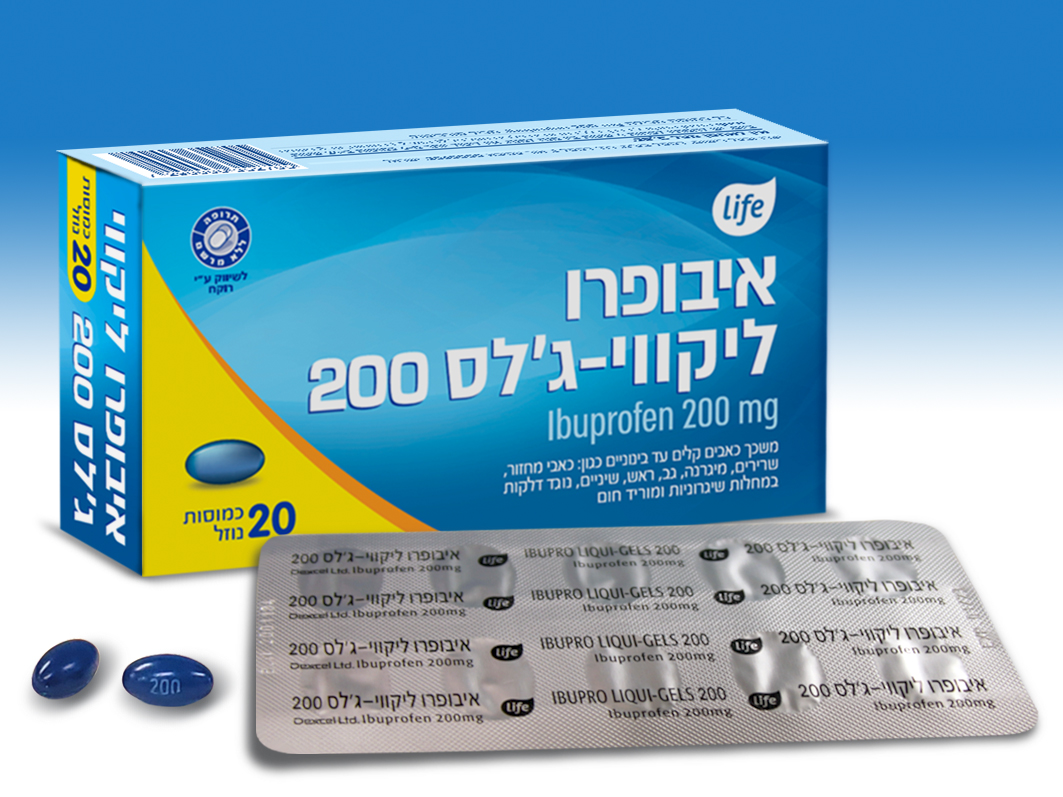Quest for the right Drug

איבופרו ליקווי - ג'לס 200 IBUPRO LIQUI - GELS 200 (IBUPROFEN)
תרופה במרשם
תרופה בסל
נרקוטיקה
ציטוטוקסיקה
צורת מתן:
פומי : PER OS
צורת מינון:
קפסולות ממולאות נוזל : CAPSULES LIQUID FILLED
עלון לרופא
מינוניםPosology התוויות
Indications תופעות לוואי
Adverse reactions התוויות נגד
Contraindications אינטראקציות
Interactions מינון יתר
Overdose הריון/הנקה
Pregnancy & Lactation אוכלוסיות מיוחדות
Special populations תכונות פרמקולוגיות
Pharmacological properties מידע רוקחי
Pharmaceutical particulars אזהרת שימוש
Special Warning עלון לרופא
Physicians Leaflet
Pregnancy & Lactation : הריון/הנקה
4.6 Fertility, pregnancy and lactation Pregnancy: Inhibition of prostaglandin synthesis may adversely affect the pregnancy and/or the embryo/foetal development. Data from epidemiological studies suggest an increased risk of miscarriage and of cardiac malformation and gastroschisis after use of a prostaglandin synthesis inhibitor in early pregnancy. The absolute risk for cardiovascular malformation was increased from less than 1%, up to approximately 1.5%. The risk is believed to increase with dose and duration of therapy. In animals, administration of a prostaglandin synthesis inhibitor has been shown to result in increased pre- and post-implantation loss and embryo-foetal lethality. In addition, increased incidences of various malformations, including cardiovascular, have been reported in animals given a prostaglandin synthesis inhibitor during the organogenetic period. During the first and second trimester of pregnancy, ibuprofen should not be given unless clearly necessary. If ibuprofen is used by a woman attempting to conceive, or during the first and second trimester of pregnancy, the dose should be kept as low and duration of treatment as short as possible. Rarely, taking NSAIDs after the 20th week of pregnancy may cause impaired renal function of the foetus, which may cause low levels of amniotic fluid (oligohydramnios). The effects were observed after days to weeks of treatment. However, in rare cases, low levels of amniotic fluid were observed already after 48 hours of taking NSAIDs. In most cases, oligohydramnios passed with the treatment discontinuation. Using NSAIDs after the 20th week of pregnancy should be limited. If it was decided that the benefit outweighs the risk for the foetus and the treatment with the medicine is essential after the 20th week of pregnancy, the lowest effective dose should be used for the shortest possible period. Referring the patient to ultrasound scan should be considered, in order to estimate the amount of amniotic fluid when the treatment with therapeutic dosage of these medicines exceeding 5 days and stopping the treatment if low levels of amniotic fluid is detected. During the third trimester of pregnancy, all prostaglandin synthesis inhibitors may expose • the foetus to: cardiopulmonary toxicity (with premature closure of ductus arteriosus and pulmonary hypertension); renal dysfunction, which may progress to renal failure with oligo-hydroamniosis; • the mother and the neonate, at the end of pregnancy to: possible prolongation of bleeding time, an anti-aggregating effect which may occur even at very low doses; inhibition of uterine contractions resulting in delayed or prolonged labour. Increased formation of oedema in the mother could occur. Consequently, ibuprofen is contraindicated during the third trimester of pregnancy. Breast-feeding: Ibuprofen and its metabolites can pass in very small concentrations (0.0008% of the maternal dose) into the breast milk and is unlikely to affect the breast-fed infant adversely. No harmful effects to infants are known, so it is not necessary to interrupt breast-feeding for short-term treatment with the recommended dose for mild to moderate pain and fever. Fertility: See section 4.4 regarding female fertility.

שימוש לפי פנקס קופ''ח כללית 1994
לא צוין
תאריך הכללה מקורי בסל
לא צוין
הגבלות
לא צוין
מידע נוסף
